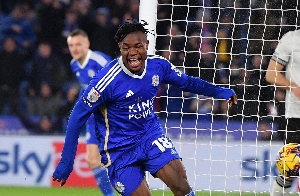Opinions of Friday, 30 December 2011
Columnist: Avornyo, Bright Selasie Yao
The 2012 Winning Gold Tips – Earn it!
There is no home like my country of birth; there is none and may be no peace anywhere but only my country of birth when I need a place of peace for an asylum. No matter where I go I shall think Ghana and when I return I shall build Ghana because my own is mine and their own is theirs. Ghana is Heaven, Period!
Peace is what we need as a country to grow from grass to grace. Even if there is hunger once there is peace it is far satisfactory than ten balls of kenkey with tilapia pepper soup. It is, however, unthinkable to have all the refugee foods in the world but where to lay our heads becomes a fiasco. After all, the Good Old Book buttresses this by saying that man shall not live by bread alone. There may be food but where to squat and eat will be a hell. No! that is not what we want as a country.
Though we cry for peace, we should never forget that there can never be peace without justice and if we want peace we must work for justice. It might not also be our intentions to bring the land of our birth into any mayhem but out actions and inactions may just do exactly what we try as much as possible to avoid - that a day may come when generations unborn may be cursing our effortless bones which may be suffering in the able hands of the little soldier, termite.
All that I am trying to say is that come December 2012, there will be another turn of both parliamentary and presidential elections. From some indications, it has become clear that the incumbent NDC will try to consolidate their hold on power for another four-year-term while the opposition parties particularly the main, NPP, will try to make history in order to unseat and give the NDC just a term in office. However, whatever the outcomes, it’s dependent on how these political parties and their disciples carry out their campaigns to the now and then discerning electorates.
It is believed that there are many considerable factors that culminate into the selection of leader(s) for a group or an organization. These factors have their degrees of influence on an individual electorate’s voting decision, that is, what will influence an electorate may not necessarily influence the other electorate or may influence him or her differently but not as it has influenced the latter. After all, one man’s meat is another man’s poison. It’s true.
It is in this view that I will like to put this piece before the public domain that my friend politicians may see, read, adopt and use for their bid for the 2012 ultimate general elections. It is never late to practice them because it is said that better late than none. Good citizen.
A study I have painstakingly conducted for my academic certificate dubbed “Selection of Leaders at Tertiary Institutions” reveal how election mechanisms influence the voting decisions of electorates. From the study, I have structured nine variables in close-ended questions including one open-ended question to measure how these mechanisms considered as variables will influence electorates’ preference for a particular candidate or the other.
Objectively, to understand the influence of campaign posters on voting decisions, I posed a researched question “do campaign posters influence the decision of tertiary students in choosing leaders.” From the responses, I have found that the influence of campaign posters is relative because 50% respondents are said to be influenced and the other 50% aren’t. And its influence is dependent on how attractively designed they are including the beauty of the image it contain with the graphics. To buttress this, Pilgrim has argued during 2010 in an article entitled Campaign Poster Ideas that the primary function of any campaign poster is to project the personality of the candidate to the voters and convey the candidate’s view about things that matter. Isn’t it?
In another specific objective, that is, “to understand the influence of campaign manifestos on the decisions of tertiary students,” I posed the question “do campaign manifestoes influence the decisions of tertiary students in choosing leaders?” For the outcome, a little over 60% are influenced while somewhat a little over 30% aren’t. Therefore, it can be understood that manifesto promises have some influences on the voting decisions of electorates but the difference between influence and not influence is not significant. To reinforce my finding, Mohammadighalehtaki, 2009, has revealed in his article on Slogan vs. Manifesto: Analyzing Election Campaigning in Iran, that a campaign manifesto promise is a tangible plan that political candidates present to the electorates as election pledge that consists of policies and programs which the individual electorate uses to evaluate the capability of the candidates.
However, the evaluation, in question, may be discretional, that is, per the understanding of the individual electorates. Therefore, convincing manifesto promises to a large extent have much influence on individuals’ voting decisions but it is not absolute. But, the onus lies on the political parties to draft a well composed manifesto with action oriented sentences so as to win the hearts of the discerning Ghanaian electorate come December 2012 and beyond. The manifesto should look a bit different from the previous ones because the electorates have had enough of the repeatedly unfulfilled promises.
Furthermore, the study had an objective to comparatively “analyze the extent to which person-to-person style of campaign (door-to-door) influence the electorates’ decisions more than class-to-class style (politically organized rallies in squares of cities and regions) of campaign.” Comparatively, both inter-personal and inter-group interactions have very high significant influence on electorates in choosing leaders, that is, over 80% are influenced by these two easy but expensive methods while only a little above 20% are said not to be influenced. It is apparently clear that then candidate Mills’ door-to-door campaign has helped him and the now Akufo-Addo’s listening tour will surely have somewhat an impact come 2012. Gradually, so will the Dr. Nduom’s determinedly seedlings grow into edible crops. The reasons are that, electorates get to know whom they are voting for and why. And my finding seeks to have somewhat advanced an argument earlier on made in 2006 by Smith on his blog article that group-based emotions in intergroup relations and political behavior is a truism that political attitudes and behaviors are pervasively shaped by people’s membership and identification with groups.
However, inter-personal interactions may be more advantageous because the aspirant gets the opportunity to get himself more out in the open and as well learns more about the individual attitudes of the electorates and how to win their hearts to his side. William Shakespeare once asked for how long can a heart continue to say no? Therefore, it is incumbent on an aspirant to consistently get in touch with the electorates so as to, if possible, get naturally magnetized with them and on a whole, genuinely win their minds and hearts towards himself for good.
Furthermore, my study also aims at examining what may be the voting patterns among students according to their levels of education. So the research question “what are the voting patterns among Diploma and Degree students” was posed. In this case, the patterns may be related to classes within our society or perhaps looking at electorates’ demographic characteristics – age, sex etc. The patterns per my finding are that majority of electorates look at the aspirant’s maturity or experience in the field he or she is to contest for. Candidates’ friendliness or relations with electorates either influence or do not.
Also, majority of students per my study do not vote for leaders because of an aspirant’s level of education. And a significant number of students do not also vote based on tribalism. So, for the mere fact that an aspirant comes from a community or has some ties with electorates do not necessarily merit him a chance of winning electoral power. On the other hand, humans are bound to disappoint be it natural or human making. On the day of voting for instance, the person whom one counts on of voting for him that dependable person may fall sick or any unforeseen circumstances may cross the road hence the urgent need for aspirants to campaign vigorously to any categories of persons without discrimination. No shyness. You should not therefore classify any constituency as your opponents’ stronghold. May be your opponent(s) might have done something unpleasant and the electorates may be looking for other options - you might just be lucky. Take advantage of every situation. Thanks.
More so, Prysby and Scavo in 1993 have researched into what is dubbed the American Voting Behavior in Presidential Elections: 1972 to 1992. They have found that voters frequently judge presidential candidates by their personal characteristics such as the knowledge, experience, honesty, morality, compassion, competence, and leadership ability of the candidates and the general abilities of the candidates, and these perceptions are important factors that influence a voting decision.
Again, Prysby and Scavo have identified that a voter may cast a ballot for a candidate because of the candidate's party affiliation but are quick to add that it is less important now than in the past. But it is still a significant factor for explaining political orientations and behavior. Now, we see a reason why people vote “skirt and blouse.”
Still on the voting patterns in terms of candidates’ recommended candidature according to Maymerg’s 2011 study on Students study voting patterns as part of diversity project; he argued that some electorates do not make informed choices or decisions on their own. Their decision making is left in the hands of others particularly opinion leaders. In this way, I urge all the 2012 parliamentary and presidential aspirants to coordinate good campaign team full of well respected people in the society and if possible celebrities who can on behalf of you recommend your candidature to the electorates to vote. This works a lot. Read it practise it.
Succinctly, electorates determine the leadership style(s) of aspirants before they vote. In view of that I posed a research question “what leadership style(s) do electorates look out for in candidates before they vote”. Per the finding, it has been analyzed that electorates look out for all leadership styles but three main qualities emerged which are charismatic, transformational and servant leader with servant leadership style ranked highest. This may therefore confirm an assertion by John, Khairudin, and Samuel in their theses on Presenting the Servant Leadership Model as a Panacea to Bad Leadership in Tertiary Education in West Africa Volume 8 Issue 4 Fall 2010. They have asserted that Servant Leadership is a solution to solving the unending problems bedeviling tertiary students’ leadership and for that matter all leaderships.
In conclusion, any 2012 presidential and parliamentary aspiring candidates with good inter-personal and inter-group interactions plus good experience or maturity, who may bring on board convincing manifesto promise with well designed campaign posters, stand a great chance of winning the 2012 general elections freely and fairly. Therefore, my people, it’s not about self defense, violence, and money swaggering, it’s about the brain with hard work and prayers. May God be with all and sundry in their quest to winning genuine political power.
By: Bright Selasie Yao Avornyo
allknowing00@yahoo.com












